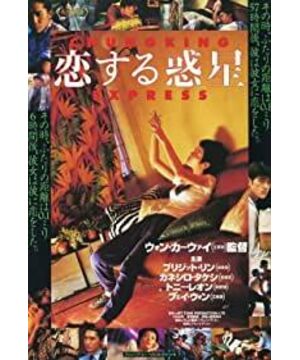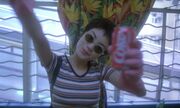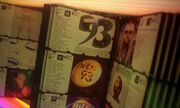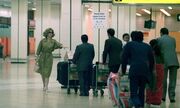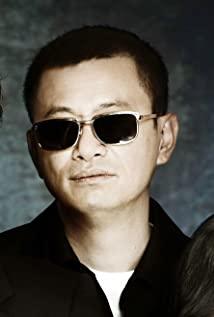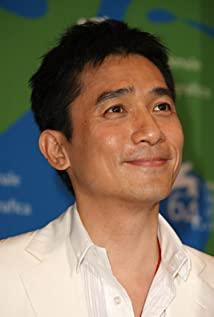Happy Spring Break~
Hello, my name is XX~ Yesterday I watched a Wong Kar Wai movie "Chongqing Forest", because the story, structure and screen layout of the movie are very personal, so it suddenly ignited my interpretation of this passion for film. I don't know if you have seen it? If you have seen it, what do you think of it?
**************************************************** ************************
XX,
thank you for your letter, and I wish you a happy Spring Break and May Day!
In addition, I'm sorry that the last class you came to audition was out of the cold - it's really the first time this semester.
It seems that you have also established a symbolic association. When you think of interpreting this signified, the signifier points to me ^^, thank you! It is an honor for teachers.
I have read "Chongqing Forest". It was when I was guiding the 2008 undergraduate graduation thesis, and a classmate analyzed it. I also read it, and it was very enjoyable. At that time, I was teaching in Guangzhou, and I felt very cordial. It is definitely the fruit of the urban culture of Guangdong and Hong Kong, and it is more appropriate in that cultural context. Here, I do not speak on behalf of the rigor of interpreting teachers, just casually talk about subjective feelings. It is definitely an "allegory" about Hong Kong's politics, economy, culture, and especially its subjectivity. An allegory of the possibility, method and healing of the survival of subjectivity in Hong Kong. Of course, from the 1990s to the present, something has changed. It's
very delicate, but it's a dream-like delicacy. (Dream has a unique meaning in our class, right?) Dream-like narrative, dream-like various shots, associations, and language connections (multi-layered and more typical Wong Kar-wai-style complex and ambiguous rhetoric, a symbol pointing to different things at the same time).
Trauma and amnesia are embodied in Tony Leung, the character who represents the subjectivity of Hong Kong. A police officer, law enforcement officer, and civil servant who is loved by everyone and is rooted in the community, lost love and memory at a critical point in time (97?). ——Abandoned with no explanation at all, people just flew away alive without warning, kissed goodbye on the escalator passing through the shopping mall with a strong atmosphere of the world, and never saw it again, without any explanation. The only thing he can do is to talk to those necessary survival facilities such as the unchanged and increasingly broken legacy hardware facilities (metaphors are towels, toothbrushes).
Then, the mainland girl Faye Wong came to fill in, and she couldn't help but curiously peeped into the hidden - she was a complete intruder, illegally sneaking into private space to spy on the privacy of all "exes", but instead of destroying, she secretly tidying up the room, doing "cleaning", and taking over everything...
The hybridity inside Chungking Mansions is a metaphor for the post-colonial economic culture (unique to Hong Kong).
Moreover, everything is ambiguous, because the emotional structure is complex, and it is impossible to distinguish between you and me, love and hate, who is more intimate, and if it becomes clear, it will be simplified. Such a unique taste of Hong Kong-style culture, (not glamorous, but folk without cultural labels), the director's love for this is an absolute highlight.
The above interpretation, I believe, is not causing confusion. On this basis, watching this film again, it seems to be more enjoyable.
And Wong Kar-wai himself may not be able to analyze this - he doesn't need to. He is dreaming. I am dreaming.
And I also like the singing of the cranberries in Faye Wong's copy, the liberation and redemption function that comes out of a quotidian (worldly) life and can suddenly rush to the sky, as another reference.
dw
*********************************
Follow-up discussion:
reading the teacher's interpretation is really thirst-quenching! When I tried to interpret it after reading it, the focus was almost all on the details, such as the comparison between Jin Chengwu and Tony Leung, such as how Faye Wong and Lin Qingxia entered, etc.; but I read the teacher combined with the politics of this special area of Hong Kong. , economy, etc. The interpretation of the characteristic background is really enjoyable! I really want to watch it again, there will be new feelings~~~
********************
The way of interpretation is ever-changing, and I have not reached the realm of the old urchin who has opened up the two veins of Ren and Du.
Because I watched it 3 years ago, if you don't say it, and the reminder from netizens today, I really completely forgot about the line of handsome guy Takeshi Kaneshiro. There are not enough emotional memories to interpret it now. Just remember that Takeshi Kaneshiro is obsessed with the expiration of the drink - one has to think of 97 as an expiration date.
A Fei also became a flight attendant after Tony Leung's ex-girlfriend? What happened after that, did you go to California? Can't remember. At that time, I had an impression that it seemed that the British Empire was out of service, and that dreams about the "future" were inseparable from the imagination of the United States.
The dog-blooded viciousness in Chungking Mansions is a legacy of the former colonial ecology. Indians and Hong Kong people are all subjects of Great Britain.
View more about Chungking Express reviews


